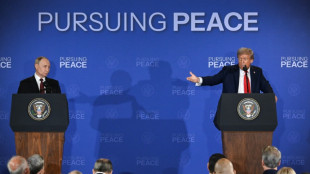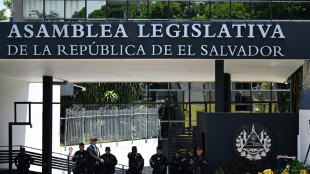
-
 Spurs get Frank off to flier, Sunderland win on Premier League return
Spurs get Frank off to flier, Sunderland win on Premier League return
-
Europeans try to stay on the board after Ukraine summit

-
 Richarlison stars as Spurs boss Frank seals first win
Richarlison stars as Spurs boss Frank seals first win
-
Hurricane Erin intensifies to 'catastrophic' category 5 storm in Caribbean

-
 Thompson beats Lyles in first 100m head-to-head since Paris Olympics
Thompson beats Lyles in first 100m head-to-head since Paris Olympics
-
Brazil's Bolsonaro leaves house arrest for court-approved medical exams

-
 Hodgkinson in sparkling track return one year after Olympic 800m gold
Hodgkinson in sparkling track return one year after Olympic 800m gold
-
Air Canada grounds hundreds of flights over cabin crew strike

-
 Hurricane Erin intensifies to category 4 storm as it nears Caribbean
Hurricane Erin intensifies to category 4 storm as it nears Caribbean
-
Championship leader Marc Marquez wins sprint at Austrian MotoGP

-
 Newcastle held by 10-man Villa after Konsa sees red
Newcastle held by 10-man Villa after Konsa sees red
-
Semenyo says alleged racist abuse at Liverpool 'will stay with me forever'

-
 Pakistan rescuers recover bodies after monsoon rains kill over 340
Pakistan rescuers recover bodies after monsoon rains kill over 340
-
In high-stakes summit, Trump, not Putin, budges

-
 Pakistan rescuers recover bodies after monsoon rains kill 340
Pakistan rescuers recover bodies after monsoon rains kill 340
-
Hurricane Erin intensifies to category 3 storm as it nears Caribbean

-
 Ukrainians see 'nothing' good from Trump-Putin meeting
Ukrainians see 'nothing' good from Trump-Putin meeting
-
Pakistan rescuers recover bodies after monsoon rains kill 320

-
 Bob Simpson: Australian cricket captain and influential coach
Bob Simpson: Australian cricket captain and influential coach
-
Air Canada flight attendants strike over pay, shutting down service

-
 Air Canada set to shut down over flight attendants strike
Air Canada set to shut down over flight attendants strike
-
Sabalenka and Gauff crash out in Cincinnati as Alcaraz survives to reach semis

-
 Majority of Americans think alcohol bad for health: poll
Majority of Americans think alcohol bad for health: poll
-
Hurricane Erin intensifies in Atlantic, eyes Caribbean

-
 Louisiana sues Roblox game platform over child safety
Louisiana sues Roblox game platform over child safety
-
Trump and Putin end summit without Ukraine deal

-
 Kildunne confident Women's Rugby World Cup 'heartbreak' can inspire England to glory
Kildunne confident Women's Rugby World Cup 'heartbreak' can inspire England to glory
-
Arsenal 'digging for gold' as title bid starts at new-look Man Utd

-
 El Salvador to jail gang suspects without trial until 2027
El Salvador to jail gang suspects without trial until 2027
-
Alcaraz survives to reach Cincy semis as Rybakina topples No. 1 Sabalenka

-
 Trump, Putin cite progress but no Ukraine deal at summit
Trump, Putin cite progress but no Ukraine deal at summit
-
Last Chance: Just 7 Days Left to Lock in the LiberNovo Omni Early-Bird Price

-
 Trump hails Putin summit but no specifics on Ukraine
Trump hails Putin summit but no specifics on Ukraine
-
Trump, Putin wrap up high-stakes Ukraine talks

-
 El Salvador extends detention of suspected gang members
El Salvador extends detention of suspected gang members
-
Scotland's MacIntyre fires 64 to stay atop BMW Championship

-
 Colombia's Munoz fires 59 to grab LIV Golf Indy lead
Colombia's Munoz fires 59 to grab LIV Golf Indy lead
-
Alcaraz survives Rublev to reach Cincy semis as Rybakina topples No. 1 Sabalenka

-
 Trump offers warm welcome to Putin at high-stakes summit
Trump offers warm welcome to Putin at high-stakes summit
-
Semenyo racist abuse at Liverpool shocks Bournemouth captain Smith

-
 After repeated explosions, new test for Musk's megarocket
After repeated explosions, new test for Musk's megarocket
-
Liverpool strike late to beat Bournemouth as Jota remembered in Premier League opener

-
 Messi expected to return for Miami against Galaxy
Messi expected to return for Miami against Galaxy
-
Made-for-TV pageantry as Trump brings Putin in from cold

-
 Coman bids farewell to Bayern before move to Saudi side Al Nassr
Coman bids farewell to Bayern before move to Saudi side Al Nassr
-
Vietnamese rice grower helps tackle Cuba's food shortage

-
 Trump, Putin shake hands at start of Alaska summit
Trump, Putin shake hands at start of Alaska summit
-
Coman bids farewell to Bayern ahead of Saudi transfer

-
 Liverpool honour Jota in emotional Premier League curtain-raiser
Liverpool honour Jota in emotional Premier League curtain-raiser
-
Portugal wildfires claim first victim, as Spain on wildfire alert


Connecticut Ends All Taxes on Purchases of Gold and Silver
HARTFORD, CT / ACCESS Newswire / July 1, 2025 / Connecticut Gov. Ned Lamont (D) signed House Bill 7287 into law which includes a provision removing the last remaining tax on purchases of gold, silver, platinum, and palladium bullion.
The Connecticut General Assembly originally considered a standalone sound money bill, carried by lead sponsor Sen. John Fonfara (D-1). The bill received a successful hearing before eventually being amended and absorbed into the state's larger budget bill.
Both Sen. Fonfara, a strong advocate for sound money and fiscal responsibility in Connecticut and Erik Bartone, managing director for Cygnus Financial Group based in Glastonbury, CT, delivered strong testimony in favor of this measure.
Connecticut had been one of only six states in the United States maintaining merely a partial sales tax exemption on purchases of precious metals. Connecticut's regressive practice of taxing only purchases under $1,000 singled out small-time savers for a tax penalty that larger gold and silver purchases do not face.
By enacting HB 7287 with the sound money language intact, Connecticut has set an example for legislators in California, Florida, Massachusetts, New Jersey, and New York, where smaller-sized purchases (under $500, $1,000, or $2,000) of precious metals are still hit with sales taxes.
The Connecticut sales tax exemption on the monetary metals will take effect on July 1, 2027.
The measure also calls for the establishment, effective upon the bill's signing, of a Connecticut precious metals working group to monitor (1) economic conditions, (2) inflation expectations, (3) precious metals prices and activities, including the market activities of leading commodities exchanges and bullion market associations, and (4) precious metals legislation proposed in or enacted by other states.
The working group will be made up of members of the General Assembly, the state treasurer, and any other individuals necessary to carry out the duties of the working group. Commencing in 2026 and annually thereafter, the working group is expected to submit a report summarizing the group's findings, including any recommendations to improve the precious metals market in the state.
Meanwhile, a full exemption bill passed in Kentucky earlier this year, as the national backlash against taxing constitutional money accelerates in today's environment of rising inflation and geopolitical conflict.
Including Connecticut, 44 U.S. states now fully or partially exempt gold and silver from the sales taxes as of this writing. That leaves 6 states and the District of Columbia as the primary jurisdictions that still harshly penalize citizens seeking to protect their savings against the serial devaluation of the Federal Reserve Note.
This year, Virginia and Maryland reimposed sales tax on all purchases of precious metals in their states, and in January 2026, Washington will begin taxing metals as well. The Sound Money Defense League and Money Metals Exchange are already in communication with lawmakers in these three states to ensure legislation is introduced next year to restore the lost exemptions.
Jp Cortez, executive director for the Sound Money Defense League, explained that "by eliminating sales taxes on purchases of precious metals under $1,000, a huge impediment has been removed to storing one's wealth in gold and silver and Connecticut has officially joined the sound money movement. The Constitution State has earned its namesake by further aligning itself with the U.S. Constitution related to sound money issues."
"Inflation has become an undeniable problem due to financial mismanagement by the Federal Reserve and by the politicians in Washington DC. Thankfully, both large and small investors in Connecticut can now protect the purchasing power of their wealth with sound money without being taxed" said Money Metals Exchange president Stefan Gleason, whose company is the leading advocate for sound money policy in the United States.
States have been removing sales taxes from monetary metals for the following reasons:
Taxing precious metals is unfair to certain savers and investors. Gold and silver are held as forms of savings and investment. States do not tax the purchase of stocks, bonds, ETFs, currencies, and other financial instruments, so it makes no sense to tax monetary metals.
Levying sales taxes on precious metals is illogical because gold and silver are inherently held for resale. Sales taxes are typically levied on final consumer goods. But precious metals are inherently held for resale, not "consumption."
Taxing gold and silver harms in-state businesses. It's a competitive marketplace, so buyers in states with precious-metals sales taxes often take their business to neighboring states that have eliminated or reduced sales tax on precious metals. Coin conventions also tend to avoid the sales tax states.
Taxing precious metals is harmful to citizens attempting to protect their assets. Purchasers of precious metals aren't fat-cat investors. Most who buy precious metals do so in small increments as a way of saving money. Precious metals investors are purchasing precious metals as a way to preserve their wealth against the damages of inflation. Inflation harms the poorest among us-including pensioners, Connecticuters on fixed incomes, wage-earners, savers, and more.
2025 has become another extremely successful year for sound money policies across the country. The Sound Money Defense League has now worked on successful 2025 legislative projects in Wyoming which will establish a $10 million state gold reserve, Idaho which reaffirmed gold and silver as constitutional money and eliminated the state capital gains tax on precious metals, Alabama which declared gold and silver to be legal tender, and now Connecticut which has ended sales taxes.
Jp Cortez
[email protected]
SOURCE: Sound Money Defense League
View the original press release on ACCESS Newswire
P.Mathewson--AMWN